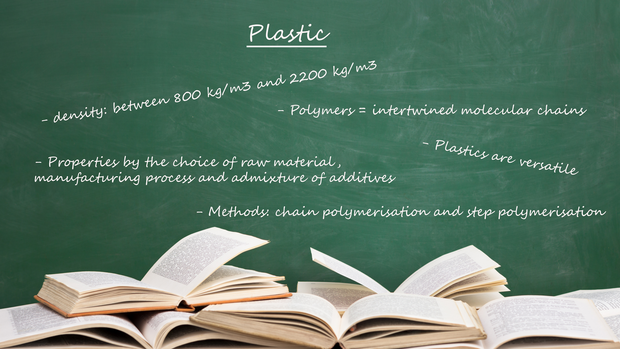Plastic is an alternative material to metal and is also colloquially referred to as "Kunststoff" (german).
The six most important types of plastic include polyethylene, polypropylene, polyvinyl chloride,
polystyrene, polyurethane and polyethylene terephthalate. Plastics bear the designation "poly"
because they consist of polymers, i.e. millions of intertwined molecular chains.
The meaning of the word "polymer" is derived from the Greek "poly" = "much" and "meros" = "part together".
The meaning of the basic building block of polymers, the monomer,
is composed of the Greek "monos" = "alone" and "meros" = "part together".
Properties of Plastic
The properties of hardness, elasticity, breaking strength, temperature resistance, heat resistance and chemical resistance of plastic
can be varied by the choice of raw material, manufacturing process and admixture of additives.
The density of plastic is between 800 kg/m3 and 2200 kg/m3, which shows that plastics are lighter than metals.
Furthermore, plastic has a much lower processing temperature of 250°C - 300°C than metal such as titanium.
These low temperatures also contribute to the fact that additives such as colourants, fibres, stabilisers or
plasticisers can be added in the processing steps. This is not possible with metal casting because additives decompose.
The thermal conductivity, electrical conductivity and strength of plastics are also lower than those of metals.
To produce plastic, monomers are joined together to form chains, the so-called "polymers". Two different methods, chain polymerisation and step polymerisation, can be used for this. In chain polymerisation, further monomers are added starting at one molecule. This method can be divided into radical polymerisation, ionic polymerisation and organometallic polymerisation. In step polymerisation, a direct reaction of the monomers with each other takes place, whereby the reaction proceeds with the release of a by-product or with the addition of monomers. This method is also decided between polycondensation, in which a by-product is released, and polyaddition, in which monomers are added. In further processing steps, the plastic can be drilled, sawn, turned or milled, for example. Primordial moulding processes are predominantly used in processing, where different and complicated shapes are possible. Plastics are versatile. They find their use in packaging material, pipes or also in floor coverings.
Are you interested in having your desired plastic component manufactured using contract manufacturing?
Submit your enquiry quickly and easily and we will get back to you with an offer in line with the market.
We look forward to hearing from you.


